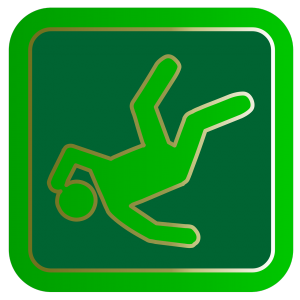 Falling as a result of slipping or tripping can result in serious injuries – broken bones, torn ligaments, deep lacerations, facial fractures, and broken teeth. These injuries can require surgery, physical therapy, and weeks or months of recovery. If you’ve fallen on someone else’s property and have been injured, the question then becomes whether or not the property owner can be held liable for your injuries and resulting losses.
Falling as a result of slipping or tripping can result in serious injuries – broken bones, torn ligaments, deep lacerations, facial fractures, and broken teeth. These injuries can require surgery, physical therapy, and weeks or months of recovery. If you’ve fallen on someone else’s property and have been injured, the question then becomes whether or not the property owner can be held liable for your injuries and resulting losses.
In many cases, these falls are the result of the property owner’s negligence – they failed to maintain their property in a condition that was safe for their guests and other visitors. An experienced personal injury attorney can help you assess whether the property owner should be held liable and whether you can recover compensation for your injuries.
However, even if the property owner failed to maintain their property in a safe condition, it may come as no surprise that the property owner is likely to claim that they should not be held liable for your injuries.
Georgia’s Modified Comparative Fault Negligence Standard
In most personal injury cases, the first question is to determine whether the other party is responsible for your injury. Once it has been determined that they are at-fault and responsible for your losses, you then need to prove how much compensation you believe you are owed. Originally, courts applied a contributory negligence standard that would bar a victim from recovering any compensation if the victim’s negligence contributed to the accident. Because this rule was so harsh in many cases, most states have adopted a modified version of this rule that reduces the amount of compensation according to the victim’s negligence.
Georgia has adopted what is referred to as a “modified comparative fault” standard. The rule works by reducing your compensation by calculating the percentage that your negligence contributed to the accident up to 50 percent. If your negligence contributed to more than 50 percent of the accident, you do not recover anything.
For example, let’s say that you fell down a broken staircase and were injured. After medical bills, lost wages, and other expenses, your claim is worth $5,000.00. However, when you fell, you were texting on your phone and therefore not paying attention. If it’s determined that your negligence contributed ten percent to the accident, your compensation would be reduced by ten percent or $500.00. If you ignored signs that said the staircase was closed, you may not be able to recover anything if your negligence contributed more than 50 percent.
Common Contributory Negligence Defenses in Slip and Fall Cases
Because of the modified comparative fault standard, property owners are likely to argue that your accident was caused by your own negligence, at least in part. Here are the arguments commonly raised by property owners in slip and fall cases:
- The hazard was obvious and easily avoided.
- You were not paying full attention to your surroundings.
- You were on a part of the property closed to guests and visitors or otherwise prohibited.
- You were wearing inappropriate clothing or footwear that contributed to the fall.
Again, if the property owner can prove that your negligence contributed more than 50 percent to the accident, you may be prohibited from receiving any compensation.
Contact a Georgia Slip and Fall Attorney Today to Schedule a Free Case Evaluation
If you’ve been injured in a fall on someone else’s property, the experienced slip and fall attorneys at Slappey & Sadd can help you get the compensation you deserve. We can assess the value of your claim, and challenge any argument that suggests you were at fault. Don’t leave your recovery in someone else’s hands – call us at 888-474-9616 or contact us online for a free consultation.
 Georgia Injury Lawyers Blog
Georgia Injury Lawyers Blog

